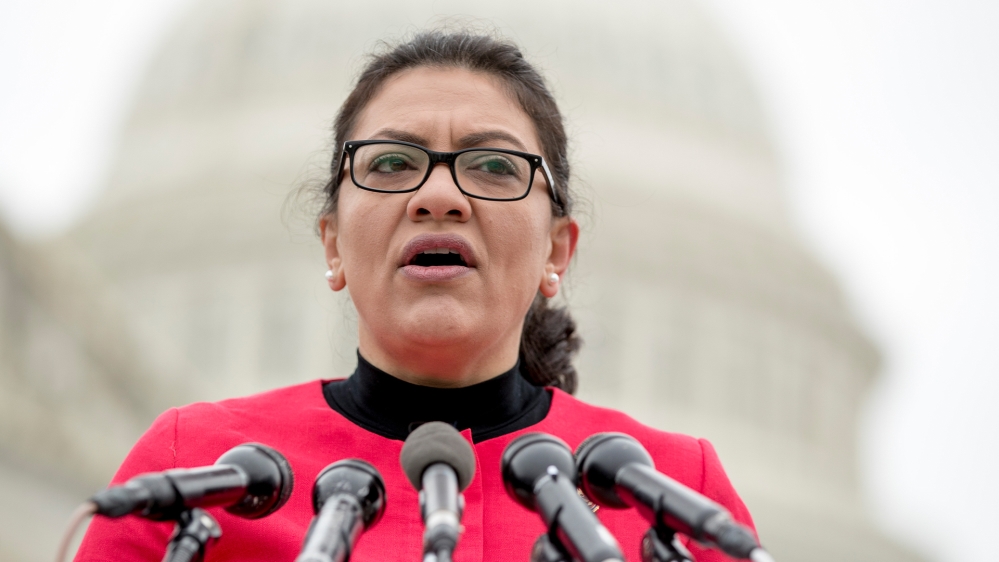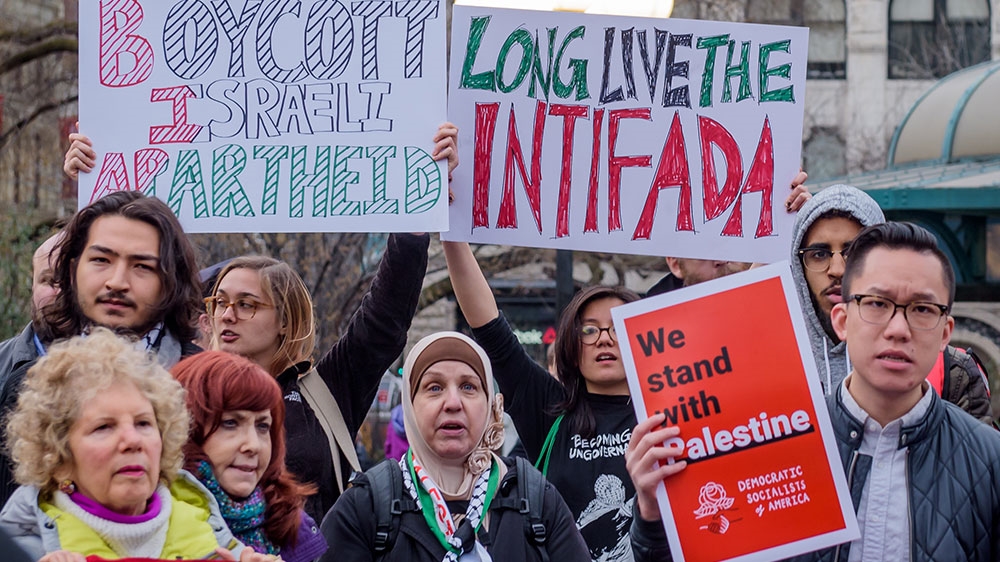
Boycott, resist, push back: Shifting Israel narratives in the US
We travel across the US to see how the discourse on Israel is evolving among politicians, journalists and activists.
The United States’s support for Israel, usually at the expense of Palestine, has been unwavering – one of the most reliably bipartisan issues in US politics – with Republicans and Democrats standing with their Israeli allies through thick and thin.
But times are changing; as is the narrative. You can see it online, in print, as well as in the halls of Congress.
Keep reading
list of 4 itemsNPR editor resigns after accusing US outlet of liberal bias
Lawmakers brawl as Georgian Parliament considers ‘foreign agent’ bill
Journalist loses foot after being badly wounded in Israeli attack in Gaza
In this special episode of The Listening Post, Richard Gizbert travels across the US to examine some of the key moments that have revealed how the discourse on Israel is shifting.
Ilhan Omar, Rashida Tlaib: Challenging the Israel narrative
The election of the first-ever Muslim women to Congress upended the discussion around Israel in the US. Ilhan Omar, a Somali-born refugee, and Palestinian-American Congresswoman Rashida Tlaib, are not only challenging President Donald Trump and the broader political consensus in Washington, but they are also speaking out like never before about the US’s unwavering support of Israel and its 52 years of occupation of the Palestinians.
“The same wave that brought Ilhan Omar, Alexandra Ocasio-Cortez and Rashida Tlaib into office, that same progressive wave is actually creating space for two Congresswomen to support Boycott, Divestment and Sanctions for the first time ever … and to call out the US’ policy on Israel more broadly,” says human rights lawyer, Noura Erakat.
“At the same time, the critique and the punishment for critiquing Israel is becoming much harsher. The heterodoxy around Israel as infallible, as something that both sides of the aisle will protect, we see that crumbling. So it makes sense that as it’s crumbling … there is a rise in the coercive force to punish those who step out of line.”

Omar and her support of Palestinians has precipitated the kind of scrutiny rarely given to freshman members of Congress.
In February, when a Republican Congressman accused her of being anti-semitic, Omar added to the swelling debate online, tweeting six words from the world of hip-hop – “It’s all about the Benjamins baby” – six words that she would be forced to apologise for. The “Benjamins” was a reference to the millions spent by lobby groups in propping-up US support for Israel.
Omar was accused of using a malevolent trope and became the target of a media smear campaign, much of it Islamophobic in tone.
“The charge of anti-Semitism is levelled at anybody who is potentially vulnerable to it,” says Omar Baddar, deputy director of the Arab American Institute. “So for example, when Thomas Friedman of The New York Times says that AIPAC ‘bought and paid for an applause line’ and got Congress to basically applaud the 2011 Netanyahu speech, nobody refers to that as anti-Semitic because they know that that charge would not stick on somebody like Thomas Friedman. By contrast, when you have a Muslim, black member of Congress making comments about the Israel lobby, she is much more vulnerable to that kind of charge.”
Is AIPAC’s influence waning?
The subject of Omar’s criticism – AIPAC, the American Israel Public Affairs Committee – has long been one of the most influential foreign-policy lobbying groups in Washington. Its annual conference is a key event in the capital’s political calendar – a mix of politics, pageantry and hardcore partisanship.
The event is traditionally a bipartisan affair, an opportunity for politicians from both sides of the aisle to burnish their pro-Israel credentials and heap praise on the special relationship.

This year, however, as Republican politicians hit the stage, there was little evidence of cross-party congeniality. GOP leaders lined up to rail against Omar and the anti-semitism that had “infected” the Democratic party.
AIPAC has a disproportionate amount of clout to shape legislation, promote pro-Israel politicians, and direct funding their way from allied donors. But it also has the power to shape what is or is not said – effectively setting the boundaries of the Palestine-Israel debate in the US.
That much of the media and political conversation around Israel has historically been mostly one-sided, is perhaps one of AIPAC’s greatest achievements.
Nonetheless, Batya Ungar-Sargon, opinions editor for The Forward, says that despite its reputation, AIPAC’s influence is waning.
“I think AIPAC’s really losing a lot of power. Trump, in a way, he obviated them, right? He’s a sort of one-man Israel lobby. So he made them a little bit obsolete on the right and he sort of made them toxic on left because anything associated with Israel is now going to have to account for its injustice.”
Marc Lamont Hill and the red lines that remain
The limits on discourse over Palestine and Israel are being challenged – but red lines remain. And, as academic and former CNN contributor Marc Lamont Hill discovered last year, the consequences for venturing beyond them can be career-threatening.
After Hill made a speech at the United Nations, in which he called for “a free Palestine from the river to the sea …”, he was branded an anti-Semitic and swiftly fired by CNN.
The irony behind that decision was not lost on Hill or his supporters. The network continues to pay former US Senator Rick Santorum for his punditry – despite the fact he once denied that Palestinians even exist.
But as Marc Lamont Hill told The Listening Post, there are double standards at play over what is said and who gets to say it.
“If I had said, as Benjamin Netanyahu’s son had said a few weeks ago on Twitter, ‘Israel is a Jewish state from the river to the sea’ I would have not been fired. I would have not been criticised, it would have gone unnoticed. Now obviously when people of colour or when Muslims say it there are, there are even lower thresholds for critique in this vein.”
Anti-BDS laws across the US: Free speech under attack?
Marc Lamont Hill fell afoul of the unspoken rules that shape the discussion of Israel. But across the US, state legislatures have passed laws that formalise limits on criticism of Israel; shielding the country from a campaign of boycotts, divestments and sanctions: the BDS movement.
Many of the anti-BDS laws are virtually identical, copy-and-paste pieces of legislation, written in clear violation of the US constitution and Americans’ First Amendment right to free speech.
One such case is George Hale, a reporter for KETR radio, a station that broadcasts out of Texas A&M University. Having once reported from the occupied West Bank and having seen the effects of the occupation, Hale supports the BDS campaign.
But when Texas passed its own BDS legislation, his employer told Hale to sign a contract stipulating that he would participate in, or speak in favour of, a boycott of Israel. He was given an ultimatum: “They told me, ‘he’ll sign it or he won’t work,’ those were the exact words from the higher-ups.”

This past April, a federal judge in Texas struck down the state’s anti-BDS law on constitutional grounds saying it threatened to “manipulate the public debate through coercion rather than persuasion.”
Hale was able to resume his work – but 27 states across the US have passed laws that impose the same restrictions on supporting the BDS movement.
“Two-hundred-and-fifty million Americans live in states where laws like these have been passed. So I think it’s important for people to understand that this is not an issue that applies to only a tiny little group of people,” Hale told The Listening Post.
“It’s not impossible to imagine a scenario in which a legislature, a state legislature could basically make your employment contingent upon you signing that you won’t boycott the NRA or boycott Planned Parenthood. And so it’s important that we kind of take a step back and realise that this is … about our rights as Americans and that really, in many ways, free speech is under attack across the United States.”
A danger to free speech in what many Americans call the “Land of the Free” – over a conflict that lies more than 4,000 miles (6,437km) away.
The 2020 elections are still almost a year and a half away. US voters will have a multitude of issues to consider before they cast their ballots. And for the vast majority, their country’s relationship with Israel will not be the deciding factor.
But elections do have a way of clarifying things. And the campaigning, the rallies, the news conferences, the TV interviews, the tweets, the terminology … all of them will reflect what Americans, be they politicians, academics or journalists, are allowed to say – what is permissible discourse on Palestine and Israel.
Contributors:
Noura Erakat – assistant professor, George Mason University
Batya Ungar-Sargon – opinions editor, The Forward
Rashida Tlaib – US Congresswoman, Representative for Michigan’s 13th district
Rebecca Vilkomerson – executive director, Jewish Voice for Peace
Lara Friedman – President, Foundation for Middle East Peace
Marc Lamont Hill – former CNN contributor and Professor, Temple University
Omar Baddar – deputy director, Arab American Institute
George Hale – reporter, KETR radio